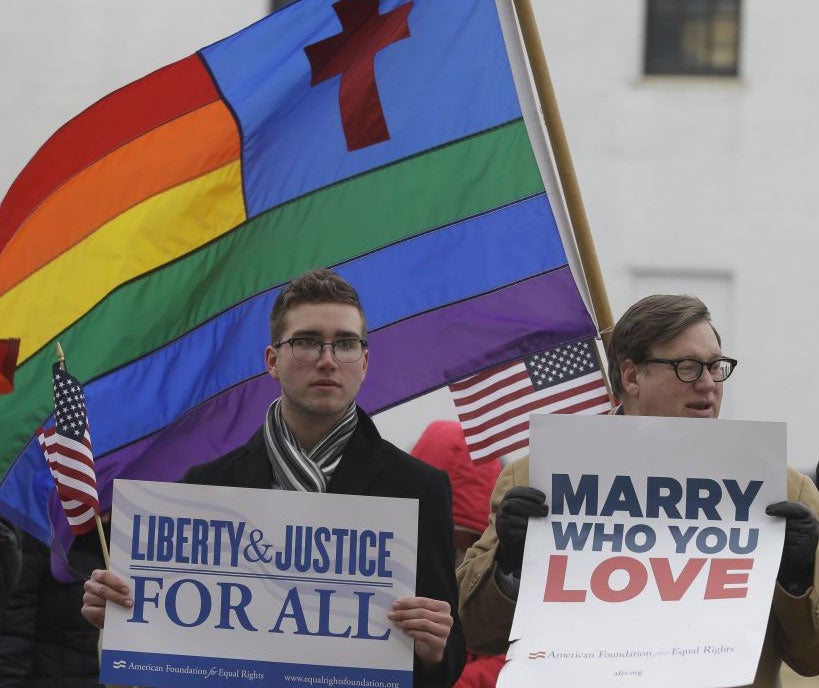US judge overturns 'unconstitutional' gay marriage ban in Virginia
But ceremonies remain on hold - possibly until Supreme Court delivers final ruling

Your support helps us to tell the story
From reproductive rights to climate change to Big Tech, The Independent is on the ground when the story is developing. Whether it's investigating the financials of Elon Musk's pro-Trump PAC or producing our latest documentary, 'The A Word', which shines a light on the American women fighting for reproductive rights, we know how important it is to parse out the facts from the messaging.
At such a critical moment in US history, we need reporters on the ground. Your donation allows us to keep sending journalists to speak to both sides of the story.
The Independent is trusted by Americans across the entire political spectrum. And unlike many other quality news outlets, we choose not to lock Americans out of our reporting and analysis with paywalls. We believe quality journalism should be available to everyone, paid for by those who can afford it.
Your support makes all the difference.A federal judge has ruled that Virginia's ban on same-sex marriage is unconstitutional, making it the first state in the traditionally conservative South to have its voter-approved prohibition overturned.
US District Judge Arenda Wright Allen issued a stay of her order while it is appealed, meaning that gay couples in Virginia will still not be able to marry until the case is ultimately resolved. Both sides believe the case won't be settled until the Supreme Court decides to hear it or one like it.
Allen's ruling makes Virginia the second state in the South to issue a ruling recognizing the legality of gay marriages.
A judge in Kentucky ruled Wednesday that the state must recognize same-sex marriages performed in other states. It did not rule on the constitutionality of same-sex marriages inside the state, however. The Virginia judge's ruling also follows similar decisions in Utah and Oklahoma federal courts.
"Through its decision today, the court has upheld the principles of equality upon which this nation was founded," the plaintiffs' lead co-counsel, Theodore B. Olson, said in a statement.
The Virginia Attorney General's Office took the unusual step of not defending the law because it believes the ban violates the equal protection clause of the Constitution. In her ruling, Wright Allen agreed.
"The court is compelled to conclude that Virginia's Marriage Laws unconstitutionally deny Virginia's gay and lesbian citizens the fundamental freedom to choose to marry. Government interests in perpetuating traditions, shielding state matters from federal interference, and favoring one model of parenting over others must yield to this country's cherished protections that ensure the exercise of the private choices of the individual citizen regarding love and family," Wright Allen wrote.
Wright Allen's stay was requested by the Virginia Attorney General's Office in order to avoid a situation similar to what happened in Utah after a federal judge declared that state's ban on gay marriages unconstitutional.
More than 1,000 gay and lesbian couples were married in the days after the ruling before the U.S. Supreme Court granted the state an emergency stay, halting the weddings and creating a cloud of uncertainty for the status of the married couples. Soon after, a federal judge also declared Oklahoma's ban unconstitutional. That ruling is also on hold while it is appealed.
"The legal process will continue to play out in the months to come, but this decision shows that Virginia, like America, is coming to a better place in recognizing that every Virginian deserves to be treated equally and fairly," Virginia Attorney General Mark Herring, a Democrat, said in a statement.
In a movement that began with Massachusetts in 2004, 17 states and the District of Columbia now allow gay marriage, most of them clustered in the Northeast. None of them is in the old Confederacy.
The Virginia case centered on a gay couple who were denied a marriage license by the Norfolk Circuit Court in July, shortly after the Supreme Court struck down the federal Defense of Marriage Act. A Chesterfield County couple who married in California and are raising a teenage daughter also later joined the lawsuit, seeking to have their marriage recognized in Virginia. The attorneys representing the plaintiffs are the same ones who successfully challenged California's voter-approved ban on gay marriages in court.
In her ruling, Wright Allen said the lesbian couple, "suffer humiliation and discriminatory treatment on the basis of their sexual orientation."
"This stigmatic harm flows directly from current state law."
Opponents of the Virginia ban say the issue resonates in Virginia in particular because of a landmark 1967 U.S. Supreme Court decision involving a Virginia couple and interracial marriage.
Mildred and Richard Loving were married in Washington, D.C., and were living in Virginia when police raided their home in 1958 and charged them with violating the state's Racial Integrity law. They were convicted but prevailed before the Supreme Court.
During verbal arguments in the case, Virginia Solicitor General Stuart Raphael said that the ban on gay marriage is legally indistinguishable from the ban on interracial marriage. He said the same arguments to defend the ban now are the same ones that were used back then, including that marriage between two people of the same sex has never been historically allowed. Wright Allen concurred with that assessment in her ruling.
AP
Join our commenting forum
Join thought-provoking conversations, follow other Independent readers and see their replies
Comments